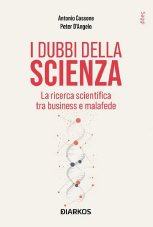BOOK REVIEWS, NOTES AND COMMENTS

I DUBBI DELLA SCIENZA
La ricerca scientifica tra business e malafede
Antonio Cassone, Peter D’Angelo
Santarcangelo di Romagna (RN): Diarkos Editore; 2025
177 p.
ISBN: 9788836163939
€ 19,00
[The doubts of science. Scientific research between business and deceit]
The doubts of science. Scientific research between business and deceit seeks to examine and critically discuss some of the complex dynamics that are currently reshaping the way scientific research is conducted and disseminated. It offers a well-documented and in-depth reflection on the challenges facing the scientific community in its effort to regain credibility and, consequently, public trust. As indicated in the subtitle Scientific research between business and deceit, scientific research is currently going through a particularly difficult time which is reflected both in its practice and in its modes of communication. This period of crisis may be regarded as a form of “pathology” that is spreading within science and the scientific community, undermining its integrity and eroding public confidence.
The work is structured as a dialogue between Antonio Cassone, a distinguished medical microbiologist and former Research Director at the Istituto Superiore di Sanità (National Institute of Health, ISS) in Rome, and investigative journalist Peter D’Angelo. The text is divided into three main sections: Science and scientific publishing, Scientists’ frauds, and The cure for restoring credibility. Each section is followed by a reflective commentary by Cassone, in which he offers personal insights that expand upon the issues discussed.
The first two sections offer a detailed analysis of the current state of scientific publishing and scientific misconduct, tracing the underlying causes that have contributed to the present crisis and identifying the various responsibilities of the different actors in the field. The opening section, Science and scientific publications, begins with a broad overview, based on Antonio Cassone’s experience, of the evolution of scientific writing and communication over the past fifty years, with particular attention on the impact of the Internet. It addresses the pressures of the “publish or perish” paradigm, the fragility and distortions of the peer-review process, and the problematic overreliance on bibliometric indicators such as the Impact Factor and the H-Index. The second section, Scientist’s frauds, addresses some of the most pressing threats to the integrity of scientific research and its dissemination. These include the reproducibility crisis, the proliferation of paper mills, the rise of predatory publishing, and the misuse or misinterpretation of preprints by the public or certain sectors of the press.
The final section, The cure for restoring credibility, moves from diagnosis to prescription, outlining possible strategies for the reforming of scientific practice and communication to recover lost trust. While the authors refrain from offering simplistic solutions, they emphasize the need for structural changes, cultural shifts within the scientific community, and renewed ethical commitments. They outline several interrelated areas of action, including continuous education in the ethics of scientific publishing, the prioritization of quality over quantity in research outputs and, consequently, a rethinking of how scientific careers are evaluated, as well as the promotion of scientific societies as primary vehicles for dissemination.
Overall, The doubts of science. Scientific research between business and deceit offers both a lucid diagnosis of the challenges affecting contemporary science and a call to action for researchers, institutions, and policymakers to foster reforms capable of restoring credibility and integrity to scientific research.
Its blend of investigative journalism and insider expertise makes it a valuable contribution to current debates on research integrity, scholarly communication, and the future of science in society. The significance of the topic, together with the clarity and accessibility of the style, ensures that the work is of considerable interest not only to scholars and researchers but also to citizens interested in this crucial issue.
Annarita Barbaro
Istituto Superiore di Sanità, Rome, Italy
